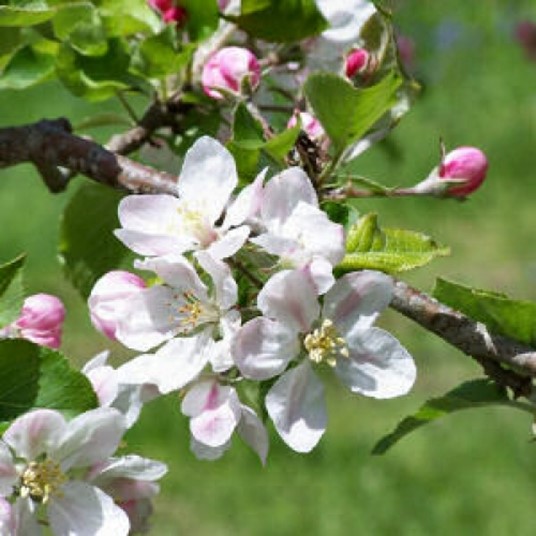As an apple among the trees of the wood, so is my beloved among the young men (Song of Songs 2:3). R. Huna and R. Aha in the name of R. Yossi b. Zimra: Why does everyone take flight from the apple tree when it is hot? Because it produces no shade to sit beneath.1 So too the nations fled from sitting in the shadow of God on the day of Matan Torah. Is it possible that Israel also fled? It is written, "with great delight I sat in his shade" – I delighted in him and sat – it was only I who delighted in him, and not the other nations.2
R. Aha in the name of R. Zeira said two things.3 One: This apple sprouts fruit before leaves,4 and so too Israel in Egypt preceded faith to hearing, as it is written: "and the nation believed, and heard that that God had given heed to Bnei Yisrael." [The second:] R. Aha said in the name of R. Zeira, in the name of Hori: Just as the fruit blossoms of the apple tree preceded its leaves, so too Israel in Sinai preceded observance to hearing (na'aseh to nishma), as it is written, "we will obey, and we will hear."5
Pesikta deRav Kahana 12, Bahodesh hashelishi: From the Blossoms of Nissan to the Fruit of Sivan6
As an apple among the trees of the wood, so is my beloved among the young men (Song of Songs 2:3). R. Huna and R. Aha in the name of R. Yossi b. Zimra: Just as everyone runs from the apple tree because it cannot provide shade, so too all the nations of the world fled from God on the day of Matan Torah. Is it possible that Israel also fled? It is written, "with great delight I sat in his shade."7
R. Ahva b. Zeora said: just as this apple tree produces fruit blossoms before leaves, so too Israel preceded observance to hearing. R. Azarya said: Just as the fruit of this apple tree are only completed in Sivan, so too Israel only produced a good scent in the world in Sivan; when was this? In the third month (Ex. 19:1).8
Shabbat 88a: Fruit Precedes Leaves, Obedience Precedes Hearing
R. Elazar said: When Israel preceded na'aseh – 'we will observe' to nishma – 'we will hear,' a divine voice came out and said: who told my sons this secret, used by the angels? […] R. Hamma in the name of R. Hanina said: It is written "as an apple among the trees of the wood" – why were Israel likened to an apple tree? To say: just as this apple tree preceded fruit to leaves, so too Israel preceded observance to hearing.9
Shir Hashirim Rabbah 8:2: Sinai is the Apple Tree
Under the apple tree I awakened you (Song of Songs 8:5) – Palatyon of Rome expounded and said: Mount Sinai was detached and stood in the heavens, and the Jews were placed underneath it, as it says, "And they approached and stood under the mountain" (Deut. 4:11).10
Shemot Rabbah 17:2: The Apple as the Beloved
Another interpretation: "Take a bunch of hyssop" (Ex. 12:22), this is why it is written, "As an apple among the trees of the wood, so is my beloved among the young men" (Song of Songs 2:3). Why is God likened to an apple tree? To tell you: Just as this apple is not much to look at, but has flavor and scent, so too is God: "His speech is most sweet, and he is altogether desirable" (Song of Songs 5:16).11 He showed Himself to the idolaters and they refused the Torah, since the Torah seemed empty to them, even though it has both flavor and scent.12 Israel said: We know the power of Torah, therefore we will remain at the side of God and his Torah, as it is written: "with great delight I sat in his shade, and his fruit is sweet to my palate" (Song of Songs 2:3).13
Pesikta de-Rav Kahana 12, Bahodesh hashelishi 3: The Sweet Scent of Mikra and Aggadah
R. Yitzhak opened: "Sustain me with raisins, refresh me with apples" (Song of Songs 2:5) – this refers to the words of Torah, whose scent is as sweet as apples. "For I am faint with love" – R. Yitzkah said: At first, when society was affluent, people would yearn for words of Mishna and Talmud; now that society is poor, and we suffer under the hands of the monarchy, people yearn for [the comforting words of] Mikra (Torah) and Aggadah (midrash).14
The Rambam's Introduction to Guide to the Perplexed
The Wise One said: "A word fitly spoken is like apples of gold in a setting of silver" (Proverbs 25:11) – Observe how wonderful this allegory is, when described through a complete allegory.15 That is to say, this is a matter with two aspects, one revealed and one concealed; that which is revealed has to be as fine as silver, and its content, which is concealed, should be as fine as that which is revealed, until the proportion between its content and its revealed part is as the proportion between gold and silver … this is like a golden apple covered with a thin layer of silver; when observing from afar one might think the apple is silver, but when one with sharp sight looks properly, he will understand that the content reveals gold.16
Shabbat Shalom
Chag Sameach
Mehalkei Hamayim
Mayim Ahronim: The blossoms of the apple tree, from Ilana Bar's website.







